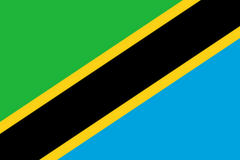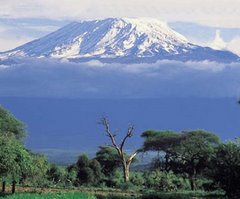 Tanzania, the largest country in East Africa, includes the spice islands of Zanzibar, Pemba, and Mafia and contains Africa's highest point—Kilimanjaro, at 5,895 meters (19,340 feet). Kilimanjaro, a dormant volcano, is snowcapped even though it is near the Equator. The African population consists of more than 120 ethnic groups.
Tanzania, the largest country in East Africa, includes the spice islands of Zanzibar, Pemba, and Mafia and contains Africa's highest point—Kilimanjaro, at 5,895 meters (19,340 feet). Kilimanjaro, a dormant volcano, is snowcapped even though it is near the Equator. The African population consists of more than 120 ethnic groups.Tanganyika, a British-controlled UN trust territory, gained independence in 1961; and Zanzibar, a British protectorate with an Arab population, became independent in 1963. Tanganyika and Zanzibar united to form Tanzania in 1964. Until resigning as president in 1985, independence leader Julius K. Nyerere guided two decades of socialism—adapted to the ujamaa policy of village farming. A multiparty system was established in 1992 after a constitutional amendment.
Some 80 percent of Tanzanians farm or fish at subsistence levels; in many areas tse-tse fly infestation hampers successful animal husbandry. Deteriorating roads and railways and high energy costs are major problems. The Ngorongoro Crater and Serengeti National Park are rich in wildlife, although poaching endangers some species. Tourism remains important. Dar es Salaam is the administrative capital, but Dodoma is the designated future capital and current home to Tanzania's legislature
ECONOMY
Industry: agricultural processing (sugar, beer, cigarettes, sisal twine), diamond and gold mining, oil refining.Agriculture: coffee, sisal, tea, cotton; cattle.
Exports: gold, coffee, cashew nuts, manufactures, cotton.
 Meeting at the Ifakara Health Research and Development Center, Ifakara, Tanzania. Tanzaria's major cause of death among adults and children is Malaria
Meeting at the Ifakara Health Research and Development Center, Ifakara, Tanzania. Tanzaria's major cause of death among adults and children is Malaria
July 14, —World Bank President Wolfowitz is greeted by Minister of Finance Zakhia Meghji, the first Tanzanian woman to hold this position. During his visit to Tanzania, Mr. Wolfowitz said that the country has made impressive progress over the past ten years with steady growth, political stability and peace.



No comments:
Post a Comment